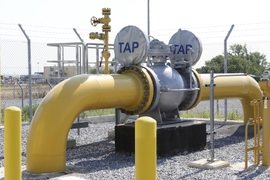Maria Zakharova, the spokeswoman for the Russian Foreign Ministry, has firmly stated that Russia categorically rejects any suggestion of exchanging territories seized from Ukraine for the release of frozen assets.
Zakharova’s remarks came in response to a report by The Wall Street Journal indicating Germany’s position on preserving Russian assets seized in the West for potential future negotiations, aimed at encouraging Russia to return a portion of the territories it occupies to Ukraine.
“Our homeland is not for sale,” Zakharova wrote on her Telegram channel on Sunday. “Russian assets must remain untouched, as any tampering will be met with a severe response to Western thievery. Many in the West have already grasped this reality. Unfortunately, not everyone.”
On April 20, the US House of Representatives passed a bill to confiscate Russian assets for the benefit of Ukraine. The frozen assets of Russia in the West are estimated at $280 billion, with five to six billion dollars in the United States and about 210 billion euros (or $224 billion) in the European Union.
Germany vehemently opposes plans to use frozen Russian assets for the reconstruction and military support of Ukraine. Berlin fears that this could set a precedent and provoke new lawsuits against Germany for crimes committed during World War II. Germany also refuses to confiscate Russian assets to protect German companies that continue to operate in the country. According to The Wall Street Journal, 272 German companies are still active in Russia.
Meanwhile, a St. Petersburg court froze the Russian assets of JPMorgan Chase pending consideration of a lawsuit from the country’s second-largest bank, VTB, which seeks to recover about $440 million in response to Washington’s plans to confiscate Russian assets. The court ordered the seizure of funds in JPMorgan’s Russian accounts and “movable and immovable property,” including the bank’s stake in a Russian subsidiary, according to a court order published on April 22.
Dmitry Medvedev, the deputy chairman of Russia’s Security Council and a former Russian president and prime minister, stated on Saturday that Russia may seize the belongings, including cash and property, of US individuals and investors in Russia in retaliation for any US expropriation of its frozen financial reserves in the West. However, Medvedev pointed out that Russia would be unable to respond in kind to any US seizure of its reserves.
“The reason is clear - we do not have a significant amount of American state property, including money, rights, and other US assets,” he said. “Therefore, the response can only be asymmetrical. It is not certain that it will be any less painful.”
In an interview with Pavel Zarubin, a journalist from the program ‘Moscow. Kremlin. Putin’ on Rossiya 1 TV channel, Kremlin spokesman Dmitry Peskov said that there is still a considerable amount of Western money in Russia that could be targeted by Moscow’s counter-measures.
“The possibilities for legal challenges against the confiscation of Russian assets will be extensive,” Vedomosti quoted Peskov as saying on Sunday. “Russia will take advantage of these and will vigorously defend its interests.”
The Russian government has made significant investments in the euro and the dollar over time to maintain the stability of the ruble. Following Russia’s invasion of Ukraine in early 2022, the Group of Seven (G7) nations, including the US, UK, Canada, France, Germany, Italy, and Japan, decided to freeze $300 billion in Russian foreign exchange reserves held in banks in these nations, the majority of which were in Europe.







 President Ilham Aliyev recently attended several inaugurations of infrastructure facilities in the liberated territories of Azerbaijan, including F...
President Ilham Aliyev recently attended several inaugurations of infrastructure facilities in the liberated territories of Azerbaijan, including F...
 In a high-profile trial that has gripped the nation, Kuandyk Bishimbayev, Kazakhstan’s former economy minister, has been sentenced to 24 years in p...
In a high-profile trial that has gripped the nation, Kuandyk Bishimbayev, Kazakhstan’s former economy minister, has been sentenced to 24 years in p...
 Iran's Foreign Ministry Spokesman Nasser Kanani has condemned the Canadian House of Commons vote in support of designating the Islamic Revolutionar...
Iran's Foreign Ministry Spokesman Nasser Kanani has condemned the Canadian House of Commons vote in support of designating the Islamic Revolutionar...
 Foreign Minister of Azerbaijan Jeyhun Bayramov met with his Armenian counterpart Ararat Mirzoyan in Almaty, Kazakhstan, to negotiate the peace agenda.
Foreign Minister of Azerbaijan Jeyhun Bayramov met with his Armenian counterpart Ararat Mirzoyan in Almaty, Kazakhstan, to negotiate the peace agenda.



